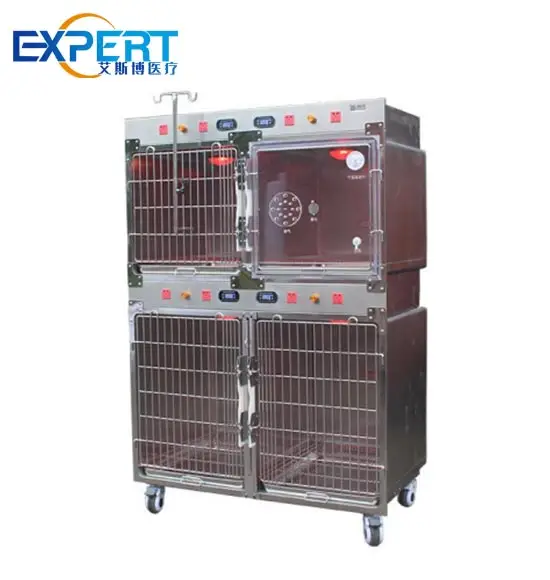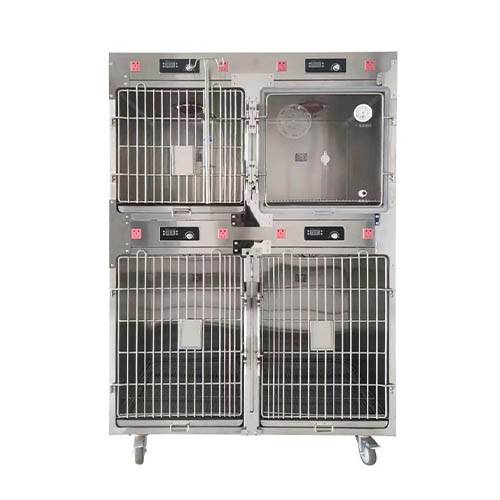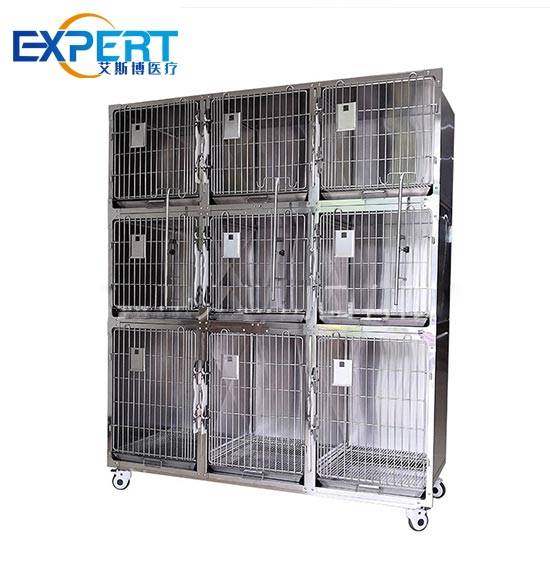Adresse
304, rue Cardinal Nord
Centre Dorchester, MA 02124
Heures de travail
Du lundi au vendredi : 7h - 19h
Week-end : 10h - 17h
Modern veterinary clinics are constantly evolving to meet the demands of animal care, and one significant advancement in this field is the use of modular veterinary cages. These innovative cages offer numerous benefits that enhance the efficiency, hygiene, and overall functionality of veterinary clinics. In this comprehensive guide, we will explore why modular veterinary cages are essential for modern clinics, examining their key features, benefits, and practical applications.

Veterinary clinics have traditionally used fixed or standard cages for housing animals. While these cages serve their basic purpose, they often lack flexibility and adaptability, making it challenging to optimize space and care for diverse animal needs. Modular veterinary cages, on the other hand, are designed to be configurable and customizable, addressing many limitations of traditional cages.
Modular veterinary cages offer a range of benefits that make them indispensable in modern clinics:
Flexibilité et personnalisation: Modular cages can be easily reconfigured to suit different animal sizes and needs, allowing for optimal space utilization.
Enhanced Hygiene: These cages are typically constructed with high-quality materials that are easy to clean and disinfect, reducing the risk of infection.
Improved Animal Comfort: With customizable features, modular cages provide a comfortable and safe environment for animals, aiding in their recovery and well-being.
Efficacité spatiale: Modular designs maximize available space, making it easier to manage a larger number of animals without compromising their comfort.
Durabilité et longévité: High-quality materials and construction ensure that modular cages are durable and can withstand the demands of a busy veterinary clinic.






Modular veterinary cages are typically made from stainless steel or high-grade aluminum, offering several advantages:
One of the standout features of modular veterinary cages is their configurability. Clinics can adjust the cage sizes and layouts to accommodate different animals, from small pets to larger breeds, ensuring optimal use of space.
Proper ventilation and lighting are crucial for animal health and comfort. Modular veterinary cages are designed with these factors in mind, featuring:
Accessibility and security are paramount in veterinary cages. Modular cages often include features such as:
In small animal clinics, space is often at a premium. Modular veterinary cages allow these clinics to:
Emergency and specialty clinics handle a wide variety of cases, requiring flexible and adaptable housing solutions. Modular veterinary cages provide the necessary versatility to:
In research and educational settings, the need for versatility and hygiene is paramount. Modular veterinary cages support these environments by offering:
| Caractéristique | Traditional Cages | Modular Veterinary Cages |
|---|---|---|
| Flexibilité | Fixed sizes and layouts | Highly configurable and customizable |
| Hygiène | Difficult to clean thoroughly | Easy to clean and disinfect |
| Animal Comfort | Limited space and comfort | Adjustable sizes for enhanced comfort |
| Efficacité spatiale | Inefficient use of space | Optimized for maximum space utilization |
| Durabilité | Varies, often less durable | High durability and longevity |
| Accessibilité | Standard access, often less secure | Secure and easy-access doors |
| Ventilation and Lighting | Basic or limited | Integrated ventilation and lighting options |

Modular veterinary cages can significantly improve the workflow within a veterinary clinic. By providing easy access to animals and customizable layouts, staff can:
The design and features of modular veterinary cages contribute to faster recovery and improved well-being of animals by providing:
Modular cages help in maintaining a well-organized clinic by:
Modular veterinary cages are essential for modern veterinary clinics due to their numerous advantages over traditional cages. They offer unparalleled flexibility, hygiene, and efficiency, making them ideal for various applications in small animal clinics, emergency and specialty clinics, and research institutions. By investing in modular veterinary cages, clinics can enhance their operational efficiency, improve animal care, and ensure a well-organized and hygienic environment.
The evolution of veterinary housing solutions has seen significant advancements, and modular veterinary cages are at the forefront of this progress. Their ability to be customized and reconfigured to meet specific needs ensures that modern clinics can provide the highest standard of care for their animal patients. Whether it’s maximizing space, enhancing workflow efficiency, or improving animal comfort, modular veterinary cages are an indispensable asset for any veterinary clinic aiming to deliver exceptional care.
Modular animal cages are typically made from stainless steel or high-grade aluminum. These materials offer durability, ease of cleaning, and resistance to rust and corrosion, making them ideal for use in veterinary clinics.
Modular veterinary cages enhance animal comfort by providing customizable cage sizes and features. This allows for adequate space and a comfortable environment tailored to the needs of different animals, promoting their well-being and recovery.
Yes, modular veterinary cages are designed for easy cleaning. Their smooth surfaces and non-porous materials allow for thorough disinfection, reducing the risk of infection and maintaining a hygienic environment.
Modular veterinary cages are highly configurable. They can be easily adjusted to fit the specific needs of different animals and clinic spaces, offering flexibility and adaptability that traditional cages lack.
The main advantages of using modular veterinary cages in a clinic include enhanced flexibility and customization, improved hygiene, increased animal comfort, efficient use of space, and better overall organization of the clinic.
